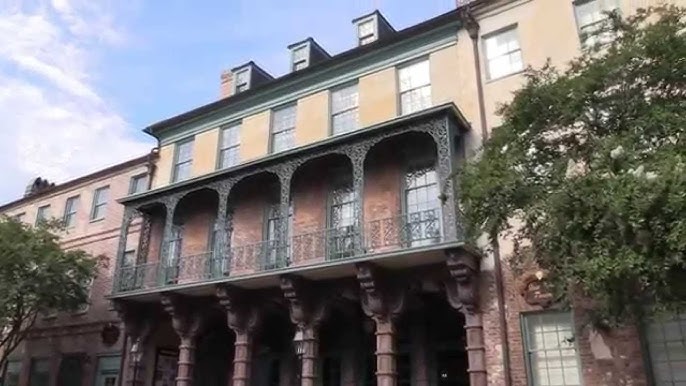Dock Street Theatre

Built in 1736, the original Dock Street Theatre marked Charleston’s emergence as a cultural center in colonial America. However, the building that stands today carries an even more complex history. After the original theater burned down in the Great Fire of 1740, the site became home to the Planters Hotel in 1809, an elegant establishment that catered to Charleston’s antebellum elite. The current structure, restored to its theatrical glory in the 1930s, combines elements of both these historical incarnations, creating a unique backdrop for the supernatural drama that continues to unfold.
Among the most famous spectral residents is Nettie Dickerson, whose tragic tale has become intertwined with the theater’s history. During the building’s hotel era, Nettie was a young prostitute who frequented the establishment. According to legend, she was struck by lightning while standing on the hotel’s second-floor balcony during a violent storm in the 1840s. Today, she appears to visitors wearing a bright red dress, an ethereal figure that drifts through the theater’s halls and along the second-floor balcony where she met her untimely end.
Another prominent ghost is that of Junius Brutus Booth, the famous Shakespearean actor and father of John Wilkes Booth. Having performed at the original Dock Street Theatre, his spirit is said to remain in the building, perhaps drawn by his passionate love of theater. Staff and visitors report seeing his apparition in period costume, particularly in the main theater and backstage areas. Some claim to hear him reciting lines from Shakespearean plays late at night when the theater is empty.
The theater’s historical connection to slavery adds another layer to its haunted reputation. The original construction utilized slave labor, and during its time as the Planters Hotel, enslaved people worked as servants. Many paranormal investigators believe these individuals’ spirits remain, with witnesses reporting shadowy figures in the basement and service areas, along with the sounds of whispered conversations and footsteps in empty corridors.
One of the most active areas is the theater’s main stage. Actors and stagehands have reported numerous supernatural occurrences during rehearsals and performances:
- Stage props mysteriously relocating between scenes
- Unexplained cold spots in specific areas of the stage
- Phantom applause echoing through an empty theater
- Lights turning on and off without human intervention
- The sound of footsteps crossing the stage during off-hours
- Ghostly figures appearing in period costume among the real actors
The theater’s green room, a traditional gathering place for performers before and after shows, is particularly rich in paranormal activity. Actors report feeling an unseen presence watching them as they prepare for performances, and many have experienced the sensation of someone adjusting their costumes or touching their shoulders reassuringly before they go on stage.
During the extensive renovation in the 1930s, undertaken as part of the Works Progress Administration project, workers reported numerous supernatural encounters. These incidents included tools disappearing and reappearing in different locations, the sounds of music and laughter coming from the empty building at night, and sightings of apparitions in both Victorian and colonial-era clothing.
The theater’s upper boxes, once preferred seating for Charleston’s elite, are known for their paranormal activity. Visitors have reported seeing well-dressed figures in period attire sitting in these boxes during performances, only to vanish when approached. The rustle of silk dresses and the scent of ancient perfume often accompany these sightings.
Modern paranormal investigations have yielded compelling evidence:
- EVP recordings capturing what appears to be 18th and 19th-century dialogue
- Unexplained temperature fluctuations, particularly around the stage and balcony
- Electromagnetic field spikes in historically significant areas
- Photographic anomalies, including orbs and mysterious figures in period dress
- Motion detectors triggering in empty areas of the building
The theater’s architectural features seem to enhance its supernatural atmosphere. The original woodwork, ornate plasterwork, and antique furnishings appear to act as conduits for paranormal energy. The building’s various renovations and additions over the centuries have created what paranormal researchers call “layers of time,” where different historical periods overlap, creating portals for supernatural activity.
Perhaps most intriguingly, the supernatural activity seems to intensify during productions of classical plays, particularly Shakespeare’s works. Some theorize that the emotional energy of these timeless performances somehow strengthens the connection between past and present, allowing the theater’s ghostly residents to manifest more strongly.
Today, the Dock Street Theatre continues to operate as a working theater while embracing its supernatural heritage. Staff members maintain records of paranormal encounters, and many performers consider it a badge of honor to have experienced something unexplainable within its walls. The theater offers historical tours that include tales of its ghostly residents, though they emphasize that the spirits seem to be benevolent, more interested in ensuring that “the show must go on” than in frightening visitors.
The building’s dual history as both a theater and hotel has created a unique supernatural environment where different types of spirits coexist – from performers who can’t quite leave the stage, to hotel guests and workers who never checked out, to the enslaved individuals whose stories remain largely untold.
For visitors to Charleston, the Dock Street Theatre offers a rare opportunity to experience both living history and supernatural phenomena in a setting that continues to serve its original purpose. Whether attending a performance, taking a tour, or simply admiring its historic architecture, guests may find themselves sharing the space with spectral audience members and ghostly performers who refuse to take their final bow.
